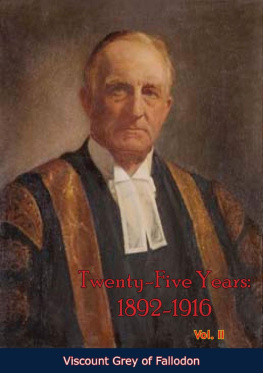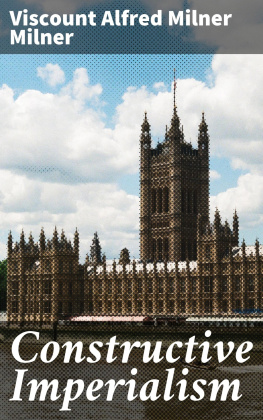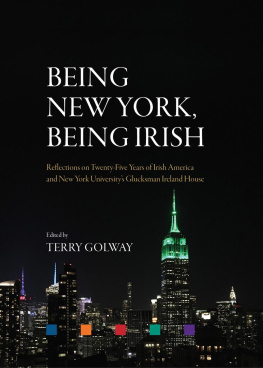This edition is published by Arcole Publishing www.pp-publishing.com
To join our mailing list for new titles or for issues with our books arcolepublishing@gmail.com
Or on Facebook
Text originally published in 1925 under the same title.
Arcole Publishing 2018, all rights reserved. No part of this publication may be reproduced, stored in a retrieval system or transmitted by any means, electrical, mechanical or otherwise without the written permission of the copyright holder.
Publishers Note
Although in most cases we have retained the Authors original spelling and grammar to authentically reproduce the work of the Author and the original intent of such material, some additional notes and clarifications have been added for the modern readers benefit.
We have also made every effort to include all maps and illustrations of the original edition the limitations of formatting do not allow of including larger maps, we will upload as many of these maps as possible.
TWENTY-FIVE YEARS1892-1916
VOLUME II
BY
VISCOUNT GREY OF FALLODON, K.G.
ILLUSTRATIONS
VISCOUNT GREY
PRINCE LICHNOWSKY. German Ambassador in London, 1912-1914
THE RIGHT HON. WINSTON SPENCER CHURCHILL, P.C.
THE RIGHT HON. EARL KITCHENER OF KHARTOUM
LORD GREYS TELEGRAM TO SIR GEORGE BUCHANAN
WALTER HINES PAGE. American Ambassador in London, 1913-1918
SIR CECIL SPRING RICE. British Ambassador in Washington, 1913-1918
COLONEL EDWARD M. HOUSE
PRESIDENT ROOSEVELT
M. VENIZELOS
THE MARQUIS IMPERIALI. Italian Ambassador in London, 1910-1921
THE RIGHT HON. D. LLOYD GEORGE
THE FOREIGN SECRETARYS ROOM AT THE FOREIGN OFFICE
THE NEW HOUSE, FALLODON (Rebuilt 1923)
THE LIBRARY AT FALLODON (New House)
WALTER HINES PAGE
CHAPTER XVII(1914)THE COMING OF WAR
A Change in the Point of ViewA Question of Naval ObligationsExamination of the Belgian IssueLord Clarendons Definition of British ObligationsThe Distinction between Belgium and LuxembourgMr. Gladstones ViewThe Movement towards Cabinet UnityThe Speech of August 3Lichnowskys Last QuestionsAt War.
BY August 1 a change in the point of view of the anti-war group was beginning to give shape to the attitude of the Cabinet as a whole. It is not possible to say with certainty how and why this change was being wrought. It is not always easy for a man to trace the inward path and steps by which he reaches his own conclusions; so much of the working of the mind is subconscious rather than conscious. If it is difficult to be sure of ones own mind, one can only guess at the processes in the minds of others. My impression is that, as war became more imminent, men began to picture to themselves the probable scenes and events of it; and the more vividly they saw these, the more uneasy they became at the prospect of Britain sitting still and immovable, while great events fraught with incalculable consequences were happening at her very doors.
The first sign of this trend of thought was the expression of an opinion that we could not stand the German Fleet coming down the Channel, and, within sight and sound of our shores, bombarding the French coast.
It might be supposed that this suggestion came as a tactical move from a pro-French quarter made and designed to shake or sap the position of the anti-war section. It was no such thing. It came spontaneously from the anti-war quarter and was based, first, simply on the ground of feeling and sentiment. But on consideration it was reinforced by a very powerful argument of a different kind. It will appear, if the reader looks back to the record of the conversations with Cambon in 1906, that not only British and French military, but also naval, authorities were in consultation. But the naval consultations had been placed on a footing satisfactory to France in 1905 before the Liberal Government had come into office. The new step taken by us in January 1906 had been to authorize military conversations on the same footing as the naval ones. For this reason, and perhaps also because the despatch abroad of our army would denude our land defence at home, it was the military more than the naval aspect of these consultations that had preoccupied us; but both had been authorized and were covered by the letter exchanged with Cambon in November 1912. These consultations had not affected the disposition of the armies. French armies were practically placed where they would have been if no Franco-British military or naval conversations had existed. The main French Army was in France. So with the British Expeditionary Force; it was disposed as best suited British military arrangements and the probable requirements of the Empire. With the fleets it was different: the French Fleet was in the Mediterranean; the main British Fleet in the waters of Great Britain. The French north and west coasts were therefore left entirely without naval defence. Had not the naval conversations then placed France (if we stood aside) at a positive disadvantage? Had they not, in fact, created an obligation, in spite of express stipulations that they were not to do so? This consideration did not originate the suggestion of guaranteeing the French north and west coasts, but it clinched it.
The promise to defend these coasts was given to France. The German Government were informed. They promised not to attack these coasts (of course on the understanding that we remained neutral), and this naval point ceased to have any direct influence on the decision of the British Government. But the Belgian point had then become paramount, and the naval point was therefore no longer a decisive one.
Meanwhile Germany had declared war on Russia. France was bound as Russias Ally, and could not remain neutral; the main German army was advancing, not on Russia, but on France, and its aggression brought the Cabinet face to face with the violation of the neutrality, first of Luxembourg, then of Belgium. The Luxembourg obligation was as slight as the Belgian was formidable. Our obligation to Luxembourg was examined. The Hansard Report of the debate on the Luxembourg Treaty in the House of Lords in 1867 was brought to me. In that debate the obligation imposed by the treaty guaranteeing the neutrality of Luxembourg was defined by Lord Clarendon, the Liberal Ex-Foreign Secretary, who agreed to it:
With regard to the guarantee, I will go somewhat further than the noble Earl at the head of the Government, and say that, if we had undertaken the same guarantee in the case of Luxembourg as we did in the case of Belgium, we should, in my opinion, have incurred an additional and very serious responsibility. I look upon our guarantee in the case of Belgium as an individual guarantee, and have always so regarded it; but this is a collective guarantee. No one of the Powers, therefore, can be called upon to take single action, even in the improbable case of any difficulty arising. (Lord Clarendon, House of Lords, June 20, 1867.)
We were all working under great pressure, and I do not remember that more than this was brought to my notice at the time. There was, however, a subsequent debate on the Luxembourg Treaty in which Lord Derby, though not less definite in distinguishing between separate and collective guarantees, gave a longer explanation of what he considered to be involved in a collective guarantee. For the sake of completeness, Lord Derbys statement is added:















